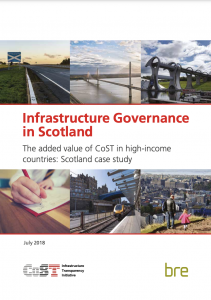By Soren Kirk Jensen, Senior Advisor, CoST
On April 30 a group of Nordic and Baltic OGP member countries convene in Edinburgh to share lessons about fiscal openness, including around infrastructure investments. This represents an opportunity to reflect on the outcome of five years of engagement with the Scottish Government around this issue. This is a good example of a process where CoST tools and standards have been impactful even if the government has not yet signed up for a membership of CoST.
Back in 2016, CoST embarked on an effort to understand the usefulness of its standards, tools and approaches in high-income countries. CoST had always had most traction in developing and emerging economies, which represents a bit of a conundrum given the universal scope of the risks and challenges in delivering public infrastructure projects on time, budget and with the promised infrastructure services as the outcome.
Among other countries, Scotland was chosen as a case. The resulting research, which was published in July 2018, found that Scotland disclosed significant levels of data for projects with a threshold above £20 million in line with CoST infrastructure data standard but less for projects below this threshold. Moreover, the data was scattered across various systems and sites which made it hard to access and make sense of. These are factors reduce the quality of the transparency as it limits the extent to which it can be used to inform meaningful stakeholder engagement. The study also found that while the Scottish government was committed to stakeholder engagement this was not systematic and depended entirely on the project owner. Hence participation was not considered to go much further than mere information sharing. One area where Scotland was performing excellently related to its comprehensive, long-term strategic planning vision for infrastructure development and this was reinforced shortly after the publication of the case study through the establishment of the Infrastructure Commission. 
The case study presented a number of recommendations which were subject to discussion with different stakeholders in the months after the publication but as often is the case with policy changes it took time before real uptake could be noticed. However, it established a strong benchmark for continued engagement. A strong partnership had also been forged with CoST’s strategic partner, the Open Government Partnership, in Scotland. An early spinoff came when CoST was invited to give testimony to an evidence session with Scottish Parliament in March 2019.
With the onset of the Covid-19 pandemic engagement slowed down but in April 2021 things picked up as a long-standing dialogue was initiated between CoST and the Infrastructure & Investment Division of the Scottish Exchequer, at the behest of OGP Scotland. This coincided with high-level developments such as the Infrastructure Commission having concluded its work, a new Infrastructure Investment Plan for 2022-2026 being published with an articulated commitment to promote meaningful public engagement and importantly, Scotland’s third OGP Action Plan 2021-2025 with a commitment on fiscal openness and transparency. Within the Infrastructure and Investment Division, a key development was the lowering of the threshold for projects included in regular reporting from £20 to £5 million in line with the recommendations of the case study, which resulted in a significantly expanded coverage of projects for which data is regularly disclosed.
“We newly propose to lower the reporting threshold to £5 million for projects and £20 million for programmes to provide even greater transparency… / … These changes are being made in response to efforts to further enhance the transparency of our reporting. In doing so, we have been guided by international best practice, including the recommendations of CoST and the OECD.” The Scottish Government in its Infrastructure Investment Plan, February 2021
Dialogue with the Infrastructure and Investment Division has since revolved around the following key issues: i) developing participatory approaches and multi-stakeholder engagement to improve and standardise approaches across infrastructure teams, feeding into the engagement process for the first Infrastructure Needs Assessment approach and ii) reviewing existing infrastructure data collection, looking for improvements and how to link this with commitments to fiscal transparency under the OGP action plan as well as how data could be systematised and used in the project prioritisation and appraisal/evaluation process.
“Scotland’s approach to infrastructure continuously aims to learn from, and apply, international best practice. Since 2018, CoST’s approach on Disclosure, Assurance, Social Accountability and Multi-Stakeholder Working has helped to shape the improvement programme for infrastructure planning and delivery in Scotland. Through the Open Government Partnership and CoST’s participation in the Planning, Infrastructure and Place Advisory Group in Scotland we are strengthening international connections and drawing on CoST expertise to enhance the approach Scotland will take to developing and reporting on it’s long-term infrastructure priorities and projects.” Katherine White, Deputy Director, Infrastructure & Investment Division, Scottish Government
In parallel, CoST joined the OGP fiscal commitment advisory (later oversight) group. The advice provided was aligned with the ongoing dialogue with the Infrastructure and Investment Division and resulted in some of the details of the fiscal openness commitment drawing on CoST core features such as improvements in structuring, standardisation and visualisation of infrastructure investment data and development of a multi-stakeholder approach to inform long term development as well as to developing the next Infrastructure Needs Assessment. It was also decided to use infrastructure expenditure in a pilot for the new fiscal transparency platform. Yet, as a report by Audit Scotland from September 2023 underlined there is a remaining need to strengthen the ability to scrutinise infrastructure investments.
The Scottish Government should: Ensure that its public reporting on infrastructure projects allows consistent monitoring of individual projects and programmes, including the benefits associated with them and where costs or timescales have increased. Audit Scotland, September 2023.
 Efforts continue to implement the OGP commitments and strengthen infrastructure data disclosure and to sustain the advice provided an update of the level of infrastructure transparency in Scotland was undertaken in April 2024. This exercise, with certain limitations in scope, indicates that the level of transparency remains high albeit with a slight decline and lack of progress on publishing the few key missing data points and more importantly a stubbornly remaining high level of fragmentation of the data. Still, with almost full availability of the data points required for proactive disclosure, Scotland represents a lighthouse in terms of infrastructure transparency. Where efforts remain to be made is in improving the accessibility and usability of the data to improve the extent to which the data can be effectively used to inform stakeholder engagement and accountability.
Efforts continue to implement the OGP commitments and strengthen infrastructure data disclosure and to sustain the advice provided an update of the level of infrastructure transparency in Scotland was undertaken in April 2024. This exercise, with certain limitations in scope, indicates that the level of transparency remains high albeit with a slight decline and lack of progress on publishing the few key missing data points and more importantly a stubbornly remaining high level of fragmentation of the data. Still, with almost full availability of the data points required for proactive disclosure, Scotland represents a lighthouse in terms of infrastructure transparency. Where efforts remain to be made is in improving the accessibility and usability of the data to improve the extent to which the data can be effectively used to inform stakeholder engagement and accountability.
These issues will be discussed at the OGP Nordic+ meeting in Edinburgh at the end of the month serving as inspiration for Nordic and Baltic countries as well as existing and new members of OGP local on how to strengthen infrastructure governance.
